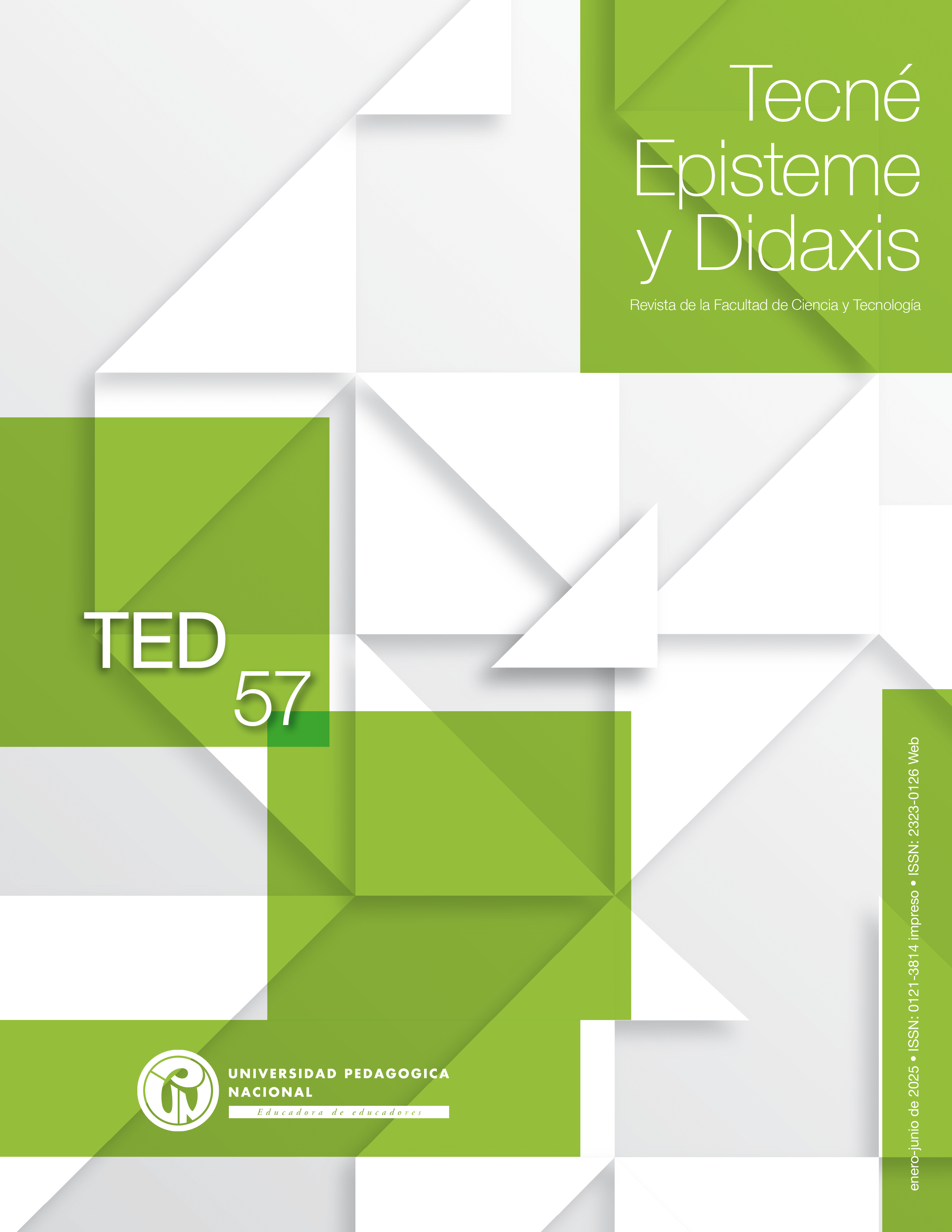El COVID-19: investigación de educación en ciencias y aportes para trabajo de aulas
Resumen
Desde una mirada compleja, exploramos cómo se podría abordar el contenido de la pandemia por COVID-19 en las aulas de educación básica. Para responder a este interrogante, se realizó una revisión documental de literatura especializada con un corpus de veinticinco textos. Los resultados apuntan a la distinción entre los conceptos de infección y pandemia para esclarecer las esferas sociales, políticas y económicas que esta última engloba. Se posicionan la combinación de múltiples modelos, la multirreferencialidad y las controversias sociocientíficas como marcos clave para el desarrollo de esta mirada compleja en las aulas. Se discuten cinco dimensiones sociales que son abordadas en estos artículos. Esta revisión forma parte de una investigación más amplia en la que se analiza el tratamiento de la pandemia en el currículo y el aula en el contexto mexicano de reforma educativa actual, por lo que discutimos el reto de concretar estas ideas en las aulas.
Citas
Allchin, D. (2020). The COVID-19 Conundrum. The American Biology Teacher, 82(6), 429-433. https://doi.org/10.1525/abt.2020.82.6.429
Bernete, F. (2013). Análisis de contenido. En A. Lucas y A. Noboa (coords.), Conocer lo social: estrategias y técnicas de construcción y análisis de datos (pp. 221-262). Universidad Complutense de Madrid.
Erduran, S. (2020). Science Education in the Era of a Pandemic: How Can History, Philosophy, and Sociology of Science Contribute to Education for Understanding and Solving the COVID-19 Crisis? Science & Education, 29, 233-235. https://doi.org/10.1007/s11191-020-00122-w
Estigarribia, L., Torrico, J., Cisnero, K., Wajner, M. y García, L. (2022). Co-design of a Teaching-Learning Sequence to Address COVID-19 as a SocioScientific Issue in an Infodemic Context. Science & Education, 31, 1585-1627. https://doi.org/10.1007/s11191-022-00362-y
Forsythe, M. y Chan, Y. (2021). Justice-centered Education Amid the COVID-19 Pandemic. The Journal of Environmental Education, 52(5), 347-357. https://doi.org/10.1080/00958964.2021.1981208
Frade, L. [SMSEMmx] (2022). Bases históricas, filosóficas y epistemológicas del marco curricular 2022 [Video]. YouTube. https://www.youtube.com/watch?v=S91WKEfuczA
Henao-Kaffure, L. y Peñaloza, G. (2021). A Critical Perspective on Pandemics and Epidemics: Building a Bridge between Public Health and Science Education. Cultural Studies of Science Education, 16, 1029-1045. https://doi.org/10.1007/s11422-021-10074-4
Kafai, Y., Xin, Y., Fields, D. y Tofel-Grehl, C. (2022). Teaching and Learning about Respiratory Infectious Diseases: A Scoping Review of Interventions in K-12 Education. Journal of Research in Science Teaching, 59, 1274-1300. https://doi.org/10.1002/tea.21797
Ke, L., Sadler, T., Zangori, L. y Friedrichsen, P. (2021). Developing and Using Multiple Models to Promote Scientific Literacy in the Context of Socio-Scientific Issues. Science & Education, 30, 589-607. https://doi.org/10.1007/s11191-021-00206-1
Leung, J. y Cheng, M. (2020). Trust in the Time of Corona: Epistemic Practice Beyond Hard Evidence. Cultural Studies of Science Education, 16, 327-336. https://doi.org/10.1007/s11422-021-10045-9
Matuk, C., Martin, R., Vasudevan, V., Burgas, K., Chaloner, K., Davidesco, I., Sadhukha, S., Shevchenko, Y., Bumbacher, E. y Dikker, S. (2021). Students Learning about Science by Investigating an Unfolding Pandemic. aera Open, 7(1), 1-19. https://doi.org/10.1177/23328584211054850
Porras, Y. (2021). La educación en ciencias en un escenario de pandemia (editorial). Tecné Episteme, Didaxis: ted, 49, 7-14. http://orcid.org/0000-0002-7111-0632
Reiss, M. (2020). Science Education in the Light of COVID-19: The Contribution of History, Philosophy and Sociology of Science. Science & Education, 29, 1079-1092. https://doi.org/10.1007/s11191-020-00143-5
Revel, A. y Adúriz-Bravo, A. (2022). In Sickness and in Health: Narratives on Epidemics as Tools for Science Teaching in Secondary Schools. Science & Education, 31, 269-291. https://doi.org/10.1007/s11191-021-00258-3
Reyes, A. (2023). ¿Revisiones sistemáticas en educación? Revista de Ciencias Sociales, 29(4), 509-520. https://doi.org/10.31876/rcs.v29i4.41273
Rezende, F., Ostermann, F. y Guerra, A. (2021). South Epistemologies to Invent Post-Pandemic Science Education. Cultural Studies of Science Education, 16, 981-993. https://doi.org/10.1007/s11422-021-10091-3
Rosenberg, J., Kubsch, M., Wagenmakers, E. y Dogucu, M. (2022). Making Sense of Uncertainty in the Science Classroom: A Bayesian Approach. Science & Education, 31, 1239-1262. https://doi.org/10.1007/s11191-022-00341-3
Sánchez, M., Navarro, F. y Sánchez, J. (2022). Las revisiones sistemáticas y la educación basada en evidencias. Espiral. Cuadernos del Profesorado, 15(30), 108-120. https://doi.org/10.25115/ecp.v15i30.7860
sep. (2022a). Plan de estudios de la educación básica 2022. Dirección General de Materiales Educativos.
sep. (2022b). De la Nueva Escuela Mexicana al Plan y los Programas de Estudio hasta los Libros de Texto Gratuitos de primaria 1.° a 6.°. Documento informativo utilizado en el Consejo Técnico Escolar en noviembre del 2022.
Smith, D. (2022). The Problem of Trust without Intimacy: Education for Handling Expert Knowledge in a Neoliberal Marketplace. Science & Education, 31, 1449-1474. https://doi.org/10.1007/s11191-022-00329-z
Sousa-Santos, B. (2020). La cruel pedagogía del virus. (trad. P. Vasile). Clacso. https://www.clacso.org/la-cruel-pedagogia-del-virus/
Tebeck, C. (2021). The Potency of Evidence Shining the Light on Inequities that Have Surfaced Due to COVID-19. The Science Teacher, 58-61. www.nsta.org/highschool
Valladares, L. (2021). Pedagogías del riesgo: alfabetización científica en tiempos de pandemia. Revista Eureka sobre Enseñanza y Divulgación de las Ciencias, 19(1), 130101-130115. https://doi.org/10.25267/
Willig, N. y Monteiro, M. (2022). Not Only Why but Also How to Trust Science: Reshaping Science Education Based on Science Studies for a Better Post‑pandemic World. Science & Education, 31, 1363-1382. https://doi.org/10.1007/s11191-021-00303-1
Zeynep, E., Kaymaz, Z., Emin, M. y LaçinŞimşek, C. (2022). Exploring the Role of Trust in Scientists to Explain Health-Related Behaviors in Response to the COVID-19 Pandemic. Science & Education, 31, 1281-1309. https://doi.org/10.1007/s11191-022-00323-5
Zucker, A. y Noyce, P. (2020). Lessons from the Pandemia about Science Education. Phi Delta Kappan, 102(2), 44-49. https://www.jstor.org/stable/26977164
Descargas
Derechos de autor 2024 Tecné, Episteme y Didaxis: TED

Esta obra está bajo una licencia internacional Creative Commons Atribución-NoComercial 4.0.























